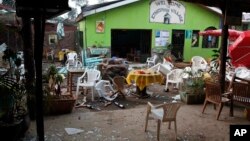An Ugandan court convicted seven people Thursday in connection with the 2010 terror attack in Kampala that killed 76 people gathered to watch the World Cup.
In all, 60 people were arrested in Uganda, Kenya and Tanzania in connection with the attack, but only 13 were charged and tried. The men, who faced multiple counts, arrived at the courthouse under heavy security. One by one, they stood at the dock while the judge read the particulars of the case and his findings.
Those found guilty of terrorism, murder and attempted murder included the man believed to have orchestrated the attacks. Judge Alphonse Owiny Dollo said the prosecution had proved that Isa Ahmed Luyima "was the mastermind ... in the execution of the heinous plan hatched in Somalia by the [Islamic extremist group] al-Shabab to attack Uganda and punish her for having contributed to AMISOM forces in Somalia."
AMISOM, the African Union Mission to Somalia, is a peackeeping mission operated by the AU with approval by the United Nations.
The attack stunned the nation. Explosives were planted at a rugby field in Kampala where people were watching the televised World Cup soccer finals and at an Ethiopian restaurant across town. A third bomb planted elsewhere in Kampala failed to detonate.
Dollo read the prosecution’s statement on how the attack was planned and executed, saying the decision "was made in Somalia, and explosives used in the Kampala attack originated from Somalia and ferried through Kenya." One suspect "delivered some of the devices to Kyadondo playground and detonated the devices by use of a phone call.”
During the trial, detainees said they had been tortured, but the court ruled that most of the confessions were admissible.
Some of those convicted could face the death penalty. Sentencing was set for Friday.
Al-Shabab, which has ties to al-Qaida, has been fighting to impose a strict version of Islam in Somalia, but the group's campaign of violence has been thwarted by African peacekeepers deployed in support of Somalia's weak, Western-backed government.
Some information for this report came from AP and AFP.




